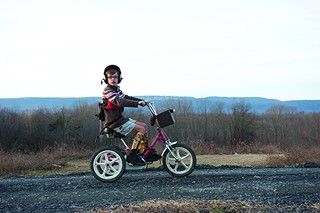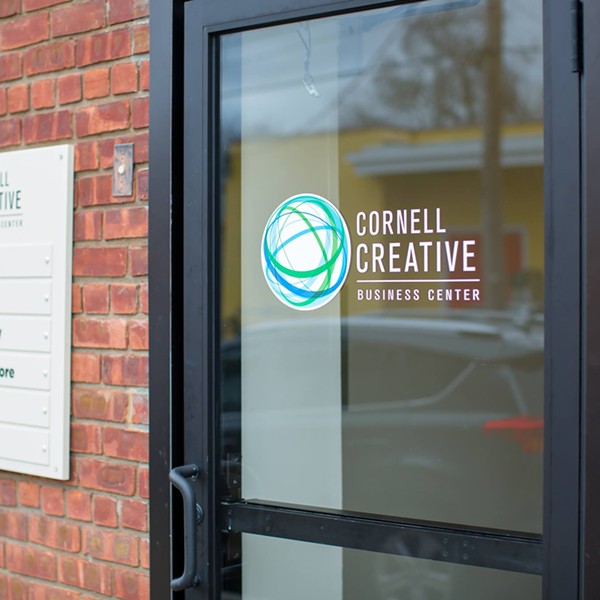Timmy just wants to keep riding his bike. His mother, Darcie Whelan Kortan, calls him yet again and admonishes him to take the shortcut. When he arrives, Kortan unclips Timmy's seat belt at the waist and chest, unstraps the leg braces from the foot pedals, folds the back brace, and turns off the lights that decorate the down tube.
There was a time when the Kortans weren't sure if Timmy would ever walk. When he and his twin sister, Evie, were born full-term, everything seemed fine. At 18 months, the doctors called him a late bloomer. But when he was two, the Kortans discovered he had some form of rare genetic disorder. That began a slow process of the Kortans figuring out the extent of Timmy's impairments and abilities. First, it was speech and mobility. Then, Timmy's vision impairment was diagnosed. Last year, they discovered his hearing impairment. With each new piece, Kortan felt another blow. "I thought, 'I can't handle another thing!' But we are handling it." Twice a year, the Kortans bring Timmy to the Children's Hospital of Philadelphia, where they see a parade of specialists. But Timmy remains undiagnosed.
The chaotic part of caretaking a child with disabilities is how easily one can become obsessed with medical diagnoses. They live with unpredictability. "I do follow up with the doctor," Kortan says, "but I'm certainly not pushing hard for an answer, because I don't think it makes a difference." In Far From the Tree, Andrew Solomon writes, "Most parenthood entails some struggle to change, educate, and improve one's children; people with multiple severe disabilities may not become anything else, and there is compelling purity in parental engagement not with what might or should or will be, but with, simply, what is."
When Timmy comes out to meet me, I'm surprised. There's a shakiness and limp, but he's walking unassisted. He wears standard glasses and looks at my eyes when we meet. I use my baby-talk experience to understand him, and Kortan speaks loudly as if with someone elderly. I expected a sight more upsetting than the handsome, friendly 10-year-old before me.
We sit in front of a 27-inch computer monitor where Timmy eagerly displays his favorite website, AccuWeather. Timmy wants to be a meteorologist. Cognitively, he seems fine. Using this monitor and the CCTV nearby, Timmy can enlarge text from a book and read independently, which he does at a first-grade level. "He does have cognitive delays," Kortan explains, "mainly due to the fact that he has so many disabilities. He has fewer ways to absorb things around him."
Finding the right technology occupies Kortan. Braille works for the blind, but not for the motor impaired; voice-recognition programs for the motor impaired don't work well for speech-impaired kids; and iPad programs for the speech impaired don't work for a motor-impaired, visually impaired child. Kortan attends technology expos and has custom-made keyguards, which help Timmy to touch his mark. "He's one in a million, so there's no one solution for him."
The Big IDEA
Functionally, parents of special needs kids collaborate with their public school to classify a child (sometimes requiring evaluation) and form an IEP (Individualized Education Plan). Dorothy Richards, the special education advocate at the Resource Center for Accessible Living (RCAL) in Kingston, can help with that. She offers trainings and workshops to walk parents and school districts through the Part 200 NY State regulations, which cover special ed. It's based on the 1975 Individuals with Disabilities Education Act (IDEA), which guarantees a Free Appropriate Public Education to American children with disabilities. "It's like reading an insurance policy," Richards says. She helps people understand their rights and the school district's responsibilities.
Richards says that school districts and municipalities are becoming more accessible, and teachers and administrators more accepting. "Sometimes there's just poor communication between parents and school districts. At times, there's a lack of trust on the parents' side towards the school district. As an advocate, I try to bridge that gap. By collaborating, we can achieve the best outcome for students." One family requested help from school officials for years, but was told there was nothing. With Richards's guidance, they got the seventh grader classified and the special education support that she and her family needed. "Sometimes mistrust comes from parents asking for help and never being told how to get it."
It was determined that Timmy needed an aide throughout the school day, where he fist-bumps and hugs his way through a morning filled with special services, like beginning Braille, speech and occupational therapy, adaptive PE, and a social skills group. His iPad, on permanent loan from the school district, reads aloud and allows him to type. "When people don't understand me," Timmy says, "I make them understand with this." Its Subway Surfer game also helped his hand-eye coordination so much that he's now able to use a touch-screen monitor in lieu of difficult mouse controls.















